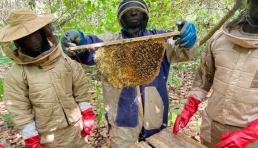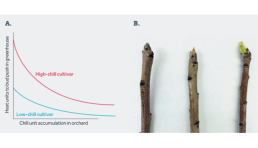Health News
Lorem ipsum
3 September 2024|
Beekeeping With Smallholder Cashew Farmers in Ghana

To stimulate and facilitate sustainable growth in the global Nut and Dried Fruit Industry.
Beekeeping is an excellent practice to integrate into cashew production. Supporting honeybee colonies increases pollination and, consequently, farmer yields. Moreover, farmers can increase and diversify their incomes through the harvest and sale of hive products. This project, led by Red River Foods, was a finalist for the 2024 INC Excellence in Sustainability Award – Back to the People.
The project has introduced beekeeping to smallholder cashew farmers in the Brong-Ahafo region of Ghana. Through the support of Red River Foods and dedicated partners, a total of 70 cashew farmers have received equipment, training, ongoing support and monitoring. The equipment provided —beehives, bee suits, smokers, hive tools, brushes and a communal honey press— provides farmers with all the protective and functional tools they need to successfully attract, raise, nurture and protect honeybees.
Participants are elected through a democratic decision-making process among farmers in the communities. Of the 70 direct project beneficiaries, 23 are women. In these communities, beekeeping is often viewed as a male-centric activity; therefore, empowering women to take up the practice is extremely important.
The project was piloted with a group of 10 farmers, trained by a partner organization. In light of the enthusiasm expressed by all parties, the decision was made to scale and grow the project, with 30 new participants taking part during the second year.
Drawing on previous experience with beekeeping in Ghana, the decision was made to contract two local graduates of a master beekeeper program that Red River Foods had previously supported. These two young Ghanaians, Stephen Adu and Akwasi Amo, had been practicing beekeeping for many years and were excited to manage this new project. With support of the Red River Foods beekeeping team, they took the lead in providing training, coordinating equipment construction and supporting farmers through continual field monitoring.
The second evolution of the project came about as a result of Stephen and Akwasi’s vision and passion for beekeeping. Because beekeeping can uplift underprivileged rural farmers to increase their crop yields and incomes, they argued, it should be accessible to all. It was therefore essential to engage with youth in the region to teach them this valuable skill.
The decision was made to directly support Stephen and Akwasi in creating a sustainable and productive beekeeping business. This support allowed the new business, Ghana Blossoms Beekeeping (GBB), to acquire a pick-up truck and a laptop computer, enabling Stephen and Akwasi to drastically increase the efficiency and reach of their monitoring efforts. In addition, this support allowed them to integrate 30 new cashew farmer trainees and provide them with 280 additional beehives. With the hives installed in the participants’ orchards, bees are now settling into their new homes and providing pollination services to the cashew trees, while building up their harvestable reserves of honey.
Participants will continue to receive practical field training and support from Stephen and Akwasi’s team, learning about best practices for the monitoring and management of bee populations. In parallel, Red River Foods will work closely with GBB to officially register the business and conduct a thorough analysis of its operations in order to ensure its sustainability and its ability to support an ambitious plan of growth across the region.
The project is already yielding results at the participant and community levels. The first positive outcome is the harvest and sale of honey. The second key outcome is the growing awareness and interest among farmers in the region. New farmers are constantly reaching out to Stephen and Akwasi to learn more about beekeeping and participate in his work. This interest is creating the potential for an emerging supply of quality honey from the region. The third outcome is tied to the vision of teaching youth a valuable skill, thus enabling them to creating their own means of income. This aspect is incredibly important, as it addresses the widespread issue of unemployed youth in the area.
The income gained by participants has already had a massive impact on their livelihoods; beekeeping provides a steady new revenue stream to supplement their income from cashew production. To date, participants have harvested 1,140 liters of honey, resulting in over US$4,500 in additional direct income. With support from the Red River Foods beekeeping team and GBB, participants are now managing 350 beehives. GBB manages an additional 700 hives in the greater area. Through this network, they are already able to commercialize over 2,500 liters of honey annually. Many participants have also reported a noticeable increase in their cashew yields, likely due to increased pollination from their managed bee populations.
In addition to the aforementioned impacts, the creation of GBB has the potential to become the project’s greatest achievement. As a registered business, GBB will be able to reliably employ a team of young people and obtain bank loans to further invest in beekeeping work and the honey trade. The business continues to gain notoriety, stoking further interest in beekeeping.
This project fills a key gap with smallholder cashew producers. Many cashew farmers generate most if not all of their income during the three-month cashew harvest period. Not only does this make it difficult to afford school, medical and general living costs throughout the year, it also makes farmers and their households vulnerable to crop failure, market volatility and other factors outside their control. By diversifying their income through a practice that they can couple with their cashew production, farmers and their families become more resilient to these external factors.
The cashew nut industry relies on millions of smallholder farmers in West Africa to maintain a steady supply of product. Therefore, this project is an excellent example of engaging directly with these farmers and empowering them to increase their incomes while also making their livelihoods and their environments more resilient. Looking forward, Red River Foods plans to continue supporting beekeeping in Ghana and expand the project into neighboring Côte d’Ivoire.
Photo: Red River Foods, Inc.
Access denied


